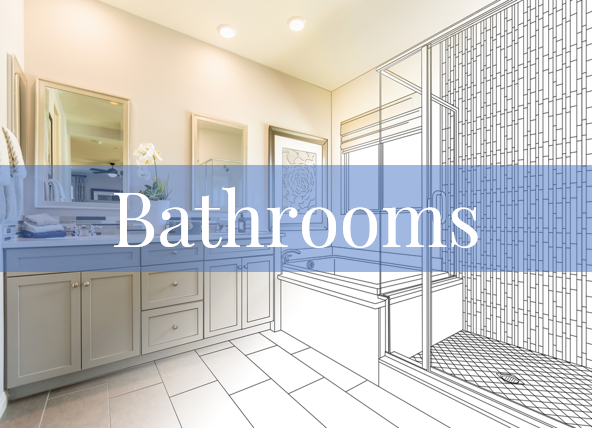Why You Should Allow a Contingency for Your Renovation Project
/Whenever we quote on a project, whether large or small, we always try to be as exact as possible. We will detail all of the steps we know are part of the project and then calculate all of the materials and labour required to complete each step. It’s a very labour-intensive process to create an exact quote for our clients. We take the time to do this because we hate surprises on projects just as much as our clients do. We want our pricing to be as exact as possible.
However, no matter how exact we are with our pricing, we still suggest that our clients allow a contingency on their project. We always get worried when our clients have a set budget and plan on spending every last dime of it. What will you do if you want to add something part way through the project or if walls or electrical boxes are opened up to reveal big deficiencies that need to be corrected? If you’ve not prepared for the unexpected, you could be forced to compromise on your dream renovation project elsewhere!
Prefer to listen?
Planning Is Essential
Lots and lots of planning are crucial to any renovation project. The more you plan, the better prepared you are going to be. However, there is still no guarantee that other things won’t come up during the project. We just started a basement bathroom renovation this week. When we demolished the existing shower, we discovered that there were only two studs along the longest 5’ wall of the shower. We’re not exactly sure what was holding up the tile backer board, but it certainly explained why most of her tiles in the shower had cracked and caused water damage. Although this was a small fix, it still added cost to the project to reframe that wall.
We had clients who were planning a kitchen renovation that included load-bearing wall removal. They made selections for their kitchen cabinets, countertops, lighting, etc. that put them almost at the top of their budget. They were so excited about the project that they even went out and purchased all of their appliances (high-end ones at that) and light fixtures before the final contract was even signed.
Once the architect started working on the drawings for the support wall removal, it was discovered that the existing support columns in the home didn’t line up, and insufficient footings were found in the basement. To correct this and still allow the load-bearing wall to be removed, a lot of additional work was required, adding just over $3000 to the cost of the project. This created a ton of stress! Not only had our clients signed a contract at almost their full budget, but they'd splurged on appliances and now had nothing left for the extra work that was required.
They decided to do some of the work themselves in order to try to make up for the additional funds. However, these clients had two young children, and both of them worked full-time. This caused even more stress because they were exhausted enough on a regular basis, and now they were coming home from work every day and trying to do some of the work on their renovation. It started to drag out the project much longer than they ever anticipated, which added even more stress.
Our clients ended up opting to have us complete all of the work as originally planned and instead decided to eliminate the new flooring for their project. As the old flooring had already been ripped up by the clients, this meant their beautiful renovation project was finished off with nothing more than a subfloor until they could afford the new flooring! This was a huge disappointment to our clients, all because they did not plan for a contingency.
How Much of a Contingency Should I Plan For?
We always recommend that our clients plan for a 10%–20% contingency. However, Bryan Baeumler, a Canadian TV host of several HGTV home improvement shows, actually recommends a 25% contingency. What this means mathematically is that if you have a budget of $40,000 for your kitchen, you shouldn’t plan on spending more than $32,000–$35,000 (or $30,000 by Bryan’s recommendation) on your initial contract. This will allow you $5,000–$8,000 for the unexpected!
Some of the Deficiencies That Can Be Found Once You Start a Renovation
There are endless things that can come up during a renovation project, but below are some of the most common ones we have encountered in over 30 years in business.
Electrical deficiencies can be found once receptacles and switches are opened up
Mould and rotted studs are sometimes found behind walls, especially when you know there has been a leak at some point
Framing that’s incorrect behind walls (not framed at 16" centres) or studs that are warped
Walls that aren’t flat, and large (12x24) tiles are intended to be installed on them. If this isn’t corrected, you will have problems with tiles cracking down the road
Your dishwasher, microwave, or fridge are not on a dedicated circuit
Your exhaust fan is vented into the attic instead of to the exterior, or your fan is connected to a 3" duct when your new fan requires a 4" duct
Your drains may not flow properly due to grease buildup over the years. This may require a lot of snaking, reworking of drainage lines, or even replacement in some cases
Additional supports or footings that may be required for load-bearing wall removal
What About Those Extra Pot Lights You Want to Add to Your Family Room?
It never fails. You think you've thought of everything for your renovation project. Planned out every detail, picked out the perfect paint colour, selected the most beautiful flooring, and then it happens! You realize that the family room, which is adjacent to your brand new kitchen, now looks dark and old next to your new kitchen! But you spent your entire budget on the kitchen, and there’s nothing left over to put in new lighting in the family room. Now your beautiful kitchen just makes the rest of the main floor look terrible!
As a project progresses, you will find that you can better visualize the end result. What wasn’t obvious at first suddenly is, and then you realize you want to make changes. If you don’t plan for a contingency for such things, you will regret it.
We did a small kitchen renovation for a client a few years ago who decided to get a new island and replace the countertop for her whole kitchen. She didn’t have it in her budget to replace the backsplash. Now that her kitchen is brand new, that backsplash looks even more dated. To this day, she regrets not getting a new backsplash. At the time of the kitchen renovation, she didn’t have the budget for it, and now she doesn’t want to risk damaging her new expensive quartz countertop.
Things You Can Do to Reduce the Stress of Your Renovation
The best advice I can give you to reduce the stress of your renovation is to not put a deadline on your contractor. Think of a situation you were in when you had to get something done by a deadline. You were probably stressed and likely didn’t perform at your best because you were feeling rushed. It’s no different for your contractor. This becomes even more evident when extras are added or deficiencies are found behind the walls that need to be dealt with. Extras take additional time, and therefore your project will not be completed in the time frame your contractor initially said it would be. You don’t want your contractor to feel rushed and be less careful, because that’s when mistakes can happen. This is your dream renovation! Allow the proper time to get it done right the first time.
Another way to reduce the stress of your project is to let your contractor know if you have a strict budget. I understand why potential clients might not want to tell a contractor they’ve just met what their budget is. I know most people think that if you say you have a budget of $30,000, then the project price will be quoted at $29,900. However, if you are interviewing an honest contractor with integrity, they will not do that to you. Essentially, if you don’t have a good feeling about your contractor and you don’t trust them enough to tell them what your budget is, then you shouldn’t be hiring them to do the job.
We have never let a client’s budget influence the way we price a job. However, if we know what the budget is for the project and we know that what the client is asking for far surpasses that budget, then we can let them know that up front and discuss alternatives. This might sound harsh, but if our client’s budget for the project isn’t realistic and there’s no room for increasing the budget or downsizing the wish list, then there’s no point in wasting everyone’s time, including the client's.
We met with a client who wanted a load-bearing wall removed, new flooring throughout the main floor, quartz countertops, all new kitchen cabinetry, and LED pot lights throughout the main floor. Their budget was $15,000, and they needed it completed within one month! Not only was their budget extremely unrealistic, but their time line wasn't doable either. Had the client not told me that information, a lot of time would have been spent putting together a quote for a project that was never going to happen.
The other advantage of knowing your budget is that your contractor can make suitable suggestions based on what he or she knows you can afford within your budget. There’s no point in a contractor getting you excited about quartz countertops if you’ve got a laminate budget.
Overall, there are two main reasons why you should plan for contingencies when doing a renovation.
It’s all about being prepared. Something could have been forgotten in the planning and quoting stages by either yourself or the contractor. Deficiencies might be found during the renovation itself. Having a contingency plan allows for this.
It helps minimize stress! This one I’ll scream from the rooftops! Renovations are stressful enough, but when you don’t have a contingency and the unthinkable happens, your stress levels go through the roof. Even a small 10% contingency can mean the difference between having the funds to fix a problem and not.
If you have further questions about how to plan your renovation budget, connect with us; we’d be happy to talk you through it. Click the button below to send us an email.























